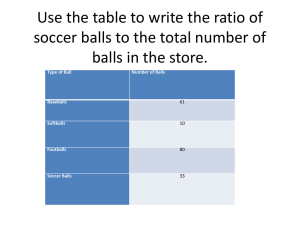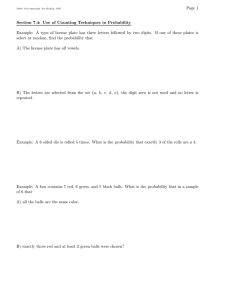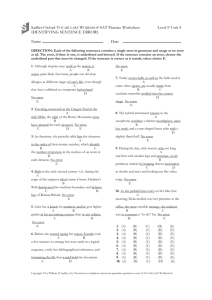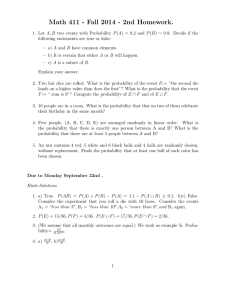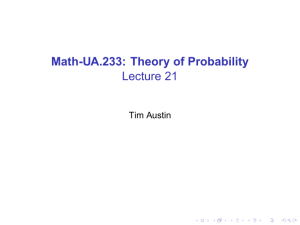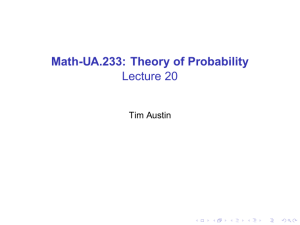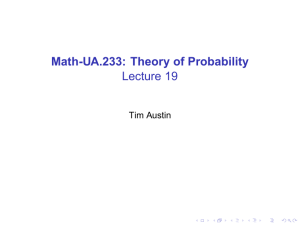Math-UA.233: Theory of Probability Lecture 14: review before the midterm Tim Austin
advertisement
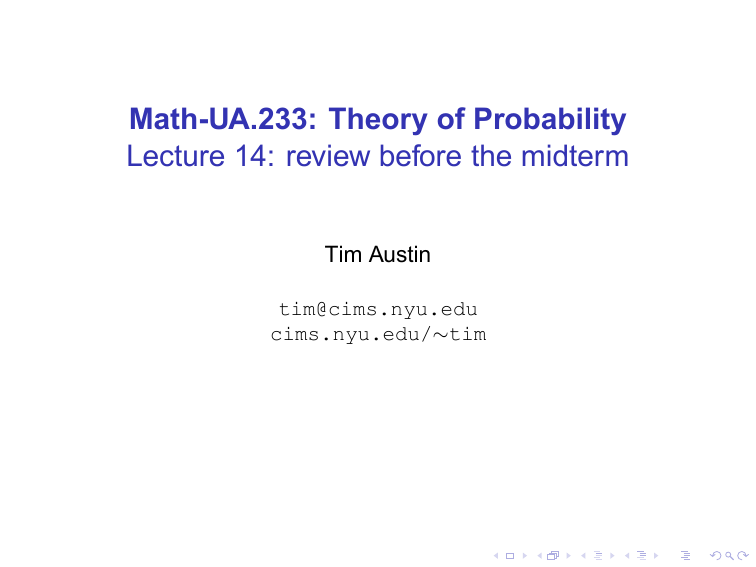
Math-UA.233: Theory of Probability Lecture 14: review before the midterm Tim Austin tim@cims.nyu.edu cims.nyu.edu/∼tim The midterm cheatsheet on the class website breaks down the definitions, theorems, facts and ideas that you need to know. Let’s start here with a more compact sketch of how the course material breaks down so far: COUNTING : PROBABILITY : COND. PROB. : RVs : The basic principle of counting Permutations, combinations, multinomial coeffs Experiments, sample spaces, outcomes, events Manipulating events, De Morgan, etc. Axioms of probability Re-arranging and computing probabilites Examples with equally likely outcomes Definition and basic calculations The Multiplication Rule The Law of Total Probability Bayes’ formula Independence: definition and use Definition Indicator variables Discrete RVs, their PMFs, calcs using the PMF Expectation and variance E[g(X )] Linearity of Expectation, expected #s of things Bernoulli and binomial RVs Poisson RVs and Poisson approximation COUNTING Example (Ross Prob 1.16) A student has to sell 2 books from a collection of 6 math, 7 science and 4 economics books. How many choices are possible if (a) both books are to be on the same subject? (b) the books are to be on different subjects? PROBABILITY, COUNTING Example (Part of Ross Self-test 2.18) Four red, eight blue and five green balls are randomly arranged in a line. Find the probability that (a) the first five balls in the line are blue. (b) none of the first five balls is blue. CONDITIONAL PROBABILITY Example (Ross Prob 3.24) Each of two balls is painted either black or gold and then placed in an urn. Each ball is painted black with probability 12 and these events are independent. (a) Suppose that you obtain information that the gold paint has been used (and so at least one ball is gold). Find the conditional probability that both balls are painted gold. (b) Now suppose in addition that you withdraw one of the balls. What is the probability that it is gold? (c) Finally, suppose the ball that you withdrew in part (b) is gold. What is the probability that both balls are gold in this case? CONDITIONAL PROBABILITY (INDEPENDENCE) Example (Adapted from Ross E.g. 4.8d) Independent trials are performed. Each results in success with probability p. Let E be the event that r successes occur before m failures. Let F be the event that the r th success occurs on or before the (r + m − 1)th trial. (a) Show carefully that E = F . (b) Find P(E ). PROBABILITY, RANDOM VARIABLES Example (Ross Prob 2.33) A forest contains 20 elk, of which 5 are captured, tagged and then released. A certain time later, 4 of the 20 elk are captured. (a) What is the probability that 2 of these 4 have been tagged? What are you assuming about the probabilities about capturing different elk? (b) Find the expected number of tagged elk among the second sample. Example (Adapted from Ross self-test 4.14) On average, Gondwanaland suffers 5.2 hurricanes per year. Small weather systems are much more common, but each of them has only a small independent probability of turning into a hurricane. (a) What is the probability that there will be three or fewer hurricanes in the next year? State any modeling assumptions. (b) Give a formula for the probability that there will be six or fewer hurricanes in the next two years. Is it greater or less than the square of the answer to part (a)? [Hint: what event that concerns the next two years would have probability equal to the square of the answer to part (a)?] CONDITIONAL PROBABILITY, RANDOM VARIABLES Example (From Ross self-test 4.13) Shane asks five separate fortune tellers whether Constanza stole his phone. Each of the fortune tellers predicts correctly with probability 0.7. Given that three of them say Constanza is guilty, what is the probability that Constanza is actually guilty?
